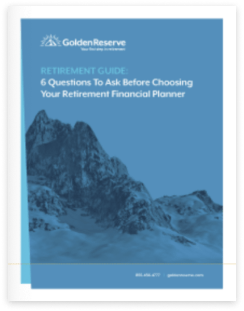Retirement Guilt: We Hesitate to Spend, Yet Overlook Advisor Fees
All our working lives, we dream of what we’ll do with the money we’ve saved and the…
Golden Reserve

Planning for retirement vs. planning in retirement. What’s the difference, you ask? If the question has you picturing Fred Astaire and Ginger Rogers crooning “to-may-to, to-mah-to, po-tay-to, po-tah-to,” we don’t blame you. But unlike Fred and Ginger, we really are talking about two different things.
Everyone understands the need to plan for retirement. But for some folks, it’s news that the planning doesn’t stop once you get there. In fact, the planning you’ll do on the other side is just as important.
When you’re planning for retirement, you’re climbing the mountain of the work/life cycle, accumulating wealth along the way. You’re planning for how much money you anticipate you’ll need in retirement and working toward that goal. There’s always the risk of a market crash that could threaten what you’ve accumulated, but for most of your climb you’ve got the benefit of time on your side. You’re still working, earning money, and letting compound interest do its magic.
When you’re planning in retirement, you’ve already reached the summit. The climbing is done. For most retirees, the focus shifts from accumulation to preservation. You want to make your money last and avoid a precipitous decline in wealth. Simply put, do you want to descend the mountain as carefully as you ascended it? Or potentially expose yourself to risks that could cause you and your hard-earned assets to tumble?
That’s precisely why we plan in retirement, to guard against some of the common risks that could cause stumbles along the way. Those risks include:
Paying too much in taxes on your IRA withdrawals, which can quickly put a dent in your account balances
Not having a plan in place to tackle long-term care costs
Unduly large investment & advisor fees
Taking on too much market risk
While your planning for retirement likely included a calculation of what your expenses will be, now it’s time to make sure you continue to have enough money to cover them—both the foreseen (like groceries) and the unseen (like medical emergencies or a spouse in long-term care). That’s why we plan in retirement, to help clients control what we can. We create an IRA de-tax draw strategy, put in place a plan for handling long-term care costs (including implementing a trust if needed), identify and eliminate high fees, and transition clients into lower risk, retirement-optimized investments.
So where do we fall on the potato tomato debate? We say keep pronouncing it however you like. Just make sure you keep planning in retirement.

Share this article
All our working lives, we dream of what we’ll do with the money we’ve saved and the…
Recently, a publication targeted toward financial advisors published an article wondering if advisor fees based on assets…
“Set it and forget it,” is the financial industry’s refrain for retirement success; as in, invest in…
Maybe You Shouldn’t Hang Out with Eddie In this adaptation from Golden Reserve Founder Greg Aler’s new…